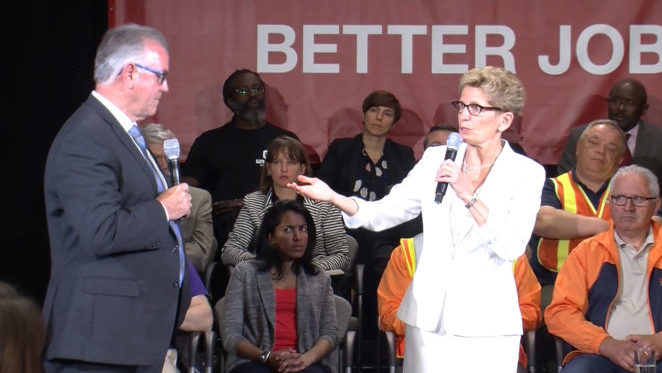[youtube]https://www.youtube.com/watch?v=5F8PBg8uekQ&feature=youtu.be[/youtube]
By: Dylan Perego & Michael Piccoli
The raise in minimum wage proposed by Premier Kathleen Wynne on Tuesday has polarized experts and workers alike, causing some to rejoice and others to say they simply aren’t satisfied.
The plan, which will raise hourly minimum wage for general workers to $14 effective Jan. 1, 2018, before finally peaking at $15 a year later, generated debate on whether the surface benefit of increased wages is what’s best for the province long term.
Karen Cocq, an organizer for the advocacy group Fight for 15 and Fairness based in Ottawa, said that while the organization has been pushing for increased wages, the announcement still came with a certain amount of shock.
“In a lot of ways, the whole thing is a surprise,” said Cocq. “We launched this campaign over two years ago and it was a build up on the campaign to raise the minimum wage to $14 from years prior. We were confident that our mobilizing was making a really big difference, but we didn’t anticipate that the rural government in a majority position would be willing to make some of the announcements that they made and so we were really happy.”
Cocq challenged the notion the increase will negatively affect small businesses, saying the opposite is true based on increased spending into local communities.
“There’s often a lot of I would say myths peddled about the impact that raising the minimum wage or addressing other issues in our precarious work will have on employment and small businesses and causing businesses to close,” said Cocq.
“There can actually be a lot of medium term and longer term growth in employment that higher wages and better working conditions can be a boom for the local economy because most minimum wage workers aren’t putting their money in off-shore tax savings, they are spending it in their neighborhoods and that drives employment in that local economy, the money in that local economy is exactly what small businesses depend on,” she said.
Ryan Mallough, policy analyst at Canadian Federation of Independent Business, was also surprised by Wynne’s proposals, but is pessimistic about the impact to Ontario’s economy.
“Frankly, we’re blindsided,” Mallough said. “We’ve been heavily involved in the changing workplaces review that is open to public consultation.
“At no point was minimum wage brought up. Minimum wage was supposed to be exempt from the review,” he said. “From an employer, it will put pressure on business costs. It will impact future hiring.”
“Young people are being overlooked,” Mallough said. “For university students, you often get your first job in a small business. This isn’t helping university students in getting new jobs”.
Mallough said the restaurant industry will be in trouble.
“They tend to have very thin profit margins,” he said. “If you increase the bus boy’s wage, then you have to increase everyone’s wage.”
Mallough said retail businesses will also be affected.
“Traditionally, the retail industry has lower wage workers,” he said. “Stores will increase their prices or will have to look at other ways to ease that cost pressure.”
Experts and organizational leaders aren’t the only ones weighing in on the issue, as students at Humber College’s North campus also express opposing views on the matter.
Second year culinary management student Robert Manger is all for the wage increase, expressing his anticipation of being able to save more money as a result.
“I think it’s a pretty good idea, $11.25 is pretty hard to get by [with],” Manger said. “Oh yeah, I will be able to pay my bills a lot easier.”
Jake Thomson, a second year Recreation and Leisure Services student, isn’t impressed with simply the perk of making more money. The increases could affect the cost of living, he said.
“A lot of people don’t realize that there’s a lot more that goes into it,” said Thomson. “If you’re talking from a business perspective, they’re going to have to cut costs to make up somewhere, whether that’s in the form of employees or increasing the costs of their services.
“That’s just starting with businesses and you haven’t even considered the taxes that the city will then start to act on,” he said.
With files from Ieva Lucs.

